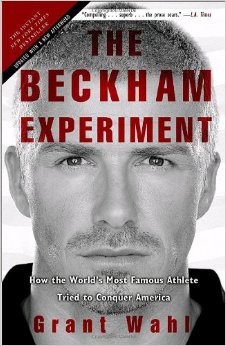 The reality of the superstar and their impact on teams whether in the business, professional sport or youth competition realms is a dynamic that all leaders need to understand. Celebrity and sports (as well as business) is a common modern narrative and it is arguable whether an individual can successfully navigate an elevated status of both their personal brand while maintaining their professional excellence over an extended period. The Beckham Experiment by Grant Wahl (2009) reads as a what-not-to-do when you’ve acquired an international mega star the likes of David Beckham. While David was not the first star that American soccer brought into the fold to attempt to elevate the environment but he certainly was the one whom many thought would be the bearer of the awakening of Major League Soccer (MLS). Most readers will recognize the Beckham name but likely share a lack of knowledge for his skill as a player nor the early history of professional soccer in the United States, to this Franklin Foer notes about this book, “David Beckham is more than a gifted player. He is a multinational conglomerate. And in Grant Wahl’s extraordinary telling, his sojourn in Los Angeles makes for a gripping tale about the business of sports and the growth pangs of American soccer.” Team owners and management groups drool at the potential for positive financial as well as performance enhancements by bringing a celebrity figure to the team. There is a mythical formula in business, professional sports and even in youth competition that theorizes the missing component is that one player who will take us over the top – and of course that one player is always somewhere other than from within the current program so that one player is cyclical pursuit by struggling organizations. For the Los Angeles Galaxy, the Beckham move brought the spotlight for a time and yet the wide angle view of the behind the scenes story serves as a modern day Aesop’s Fable for any leadership team when working with star athletes or employees. If you were compiling a list of what you should not do, the list might include rushing an injury, mismanaging personalities, surrendering control and poor communication, which not too coincidentally are all plot points in the account of Beckham and the Galaxy. Good teams become great ones when the members trust each other enough to surrender the Me for the We. – Phil Jackson Of particular significance to the soccer community affecting team dynamics and the nature of the game was how the Galaxy management handled the captaincy of the club. With what appears to be total disregards for the process of the honor of donning the team captain’s arm band, rather than allow nature to take its course, one that likely would have arrived at the desired result, those in leadership positions attempted to force the issue. For those who aren’t familiar with the concept, the team captain in soccer is a cherished position which recognizes a player who emulates the team values, sets a tone for the group and serves as a key intermediary between the coaches and players. Alexi Lalas, a former player and American national team star now serving as the general manager of the Galaxy noted, “In a professional sports environment you’d be surprised to know the gravity with which it’s [captains armband] seen and how important it ends up being.” Given David Beckham’s prestige as a player as well as a star, if David came to camp and played as expected it would have been a natural progression for him to be named captain voluntarily by the players as well as the standing captain, the young Landon Donovan who was an up and coming star in his own right. Instead there was a table side meeting wherein the suits of the organization in all their wisdom decided they would prime the pump for Beckham’s reception within the LA Galaxy by awkwardly asking Landon to hand over the captain’s armband before the international celebrity had even set foot on the pitch. As the story goes, David either was not the leader that the Galaxy expected or perhaps so much of the star’s life was manufactured behind the scenes as it was being done in Los Angeles. As noted by Wahl, “It was one thing to take part in team events, but it was another thing to lead, to act like a captain, to rally the players during tough times and represent the greater good of the team—with the coach, with the front office—even when it might not have been in the personal interest of the captain himself.” There came to be a recognition that David was a good teammate who knew how to joke around as well as when to turn in on to be serious and/or competitive, yet when the team needed a boost or the captain to take the lead, Beckham did not take the prompts to intervene as a captain. So, Captain Galaxy, as some referred to David, was known to be a good teammate yet a bad captain. David was placed in a role that he had not earned and perhaps was not the right fit for which was one of the many examples of the bumbling of the Beckham Experiment. This process sold a lot of tickets for many clubs which were struggling for revenue within the MLS but ultimately did little to propel the Galaxy’s success internally nor externally. Someone once told me the definition of Hell: The last day you have on earth, the person you became will meet the person you could have become. - Anonymous Internally the Los Angeles team enjoyed the elevated status on road trips as they stayed in more elegant hotels than they had prior to David’s arrival and were received as rock stars whenever they went out on the town following games but were split as a locker room with regards to how the team dynamics developed with Beckham on the American pitch. The right players in the right roles executed within the clear vision of the team was absent. A team needs clarity from top to bottom in order to execute a plan with any chance of attaining success. Externally the Los Angeles organization made money on their experiment even though they could not put a consistent winning effort together in the three seasons that Beckham was associated with the team. The dawn of the Bruce Arena era demonstrated a glimpse of how to effectively hold a mega star accountable to the mission of the team even if their coaching group was unable to keep the elaborate experiment that they inherited on its tracks. Leadership, identity, clarity and accountability were all essential ingredients for success that came after the Beckham experiment was over. The responsibility for these failures should not be solely applied to David as the organization as a whole failed to plan clearly, execute consistently or create accountability within the system that would allow the Galaxy to optimize the opportunity. Every team that hinges their turn around and success on the acquisition of a star player soon finds that most problems are not solved by a single individual. With The Beckham Experiment and the LA Galaxy there is so much more that rests in the column of what could have been than in the account of what transpired for the good of the team. For a team to be successful it needs to operate on clear vision, values and principles that are carried out from top to bottom. Superstars need a solid structure around them as much as any other player does, it is only with a strong organizational framework that all parties will have the greatest chance for success. Managers need to manage. Coaches need to coach. While stars get some fringe benefits as well as some special treatment, at the end of the day all players need to play regardless of how famous they are. When everyone understands their roles and focuses on being the best they can be in that role, even if that means sacrificing personal glory for team achievement, within this combined effort is the recipe for sustained success.
0 Comments
 My first pitch of 2017 has been picked up and published. You might say that free Lance is the best Lance that I've known, but to be honest I would really enjoy meeting paid Lance. Paid Lance is the Lance that I hope to meet this year. God has a sense of humor, of this I am convinced. I don't want to call it a resolution or even a goal, but I am making a conscious effort to be more positive day to day. As it turns out my first article published for this new year was picked up by The Daily Positive and for this we LOL. You can read How To Identify The Right Mentor by Jon Isaacson HERE. To wet your appetite for the casserole of creativity that this article will unleash, enclosed is an exclusive excerpt: Successful professionals understand the importance of learning the hard skills of their chosen craft. But when it comes to management skills, the value of mentorship is often forgotten. Mentoring is a relationship of purpose wherein Professional A enlists Professional B to assist in his personal and/or professional development. Mentorship is broad and unique to the various industries and stages of professional development. If mentorship were an actual ship, what would that sea craft look like and how can individuals apply this to their search for the right mentor? Thank you for reading in 2016, hope you all have a fun and fulfilling pursuit of joyfulness in 2017! |
AuthorThoughts on personal and professional development. Jon Isaacson, The Intentional Restorer, is a contractor, author, and host of The DYOJO Podcast. The goal of The DYOJO is to help growth-minded restoration professionals shorten their DANG learning curve for personal and professional development. You can watch The DYOJO Podcast on YouTube on Thursdays or listen on your favorite podcast platform.
Archives
March 2023
Categories
All
<script type="text/javascript" src="//downloads.mailchimp.com/js/signup-forms/popup/unique-methods/embed.js" data-dojo-config="usePlainJson: true, isDebug: false"></script><script type="text/javascript">window.dojoRequire(["mojo/signup-forms/Loader"], function(L) { L.start({"baseUrl":"mc.us5.list-manage.com","uuid":"b9016446bd3c6a9f0bd835d4e","lid":"83282ffb9e","uniqueMethods":true}) })</script>
|
Jon Isaacson |
Connect. Collaborate. Conquer.
© COPYRIGHT 2015. ALL RIGHTS RESERVED.
|



 RSS Feed
RSS Feed